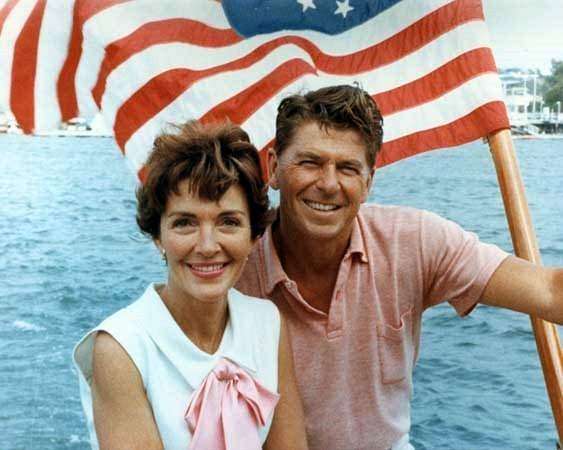5 Things To Watch for In Tonight's GOP Presidential Debate
Can you say Ronald Reagan?
Hold onto your couch cushions: Tonight's Republican debate sequel will be bigger, longer, and more Reagan-y than last month's record-setting first one. Set to clock in at a hope-draining three hours long, the prime time debate, which starts at 8 p.m. ET on CNN, will feature an expanded, 11-person field—including all 10 candidates who appeared at the first GOP debate last month, plus Carly Fiorina, the former tech company CEO whose recent poll numbers qualified her for entry. (CNN will also hold a happy hour debate for second tier candidates, this time with just four low-polling presidential hopefuls, starting at 6 p.m.)
Going into tonight's face off, the big story is, once again, Donald Trump, who has not only held onto his lead, but has increased it over the last month, holding a series of well-attended mega-rallies while continuing to get into a variety of spats with other candidates.
Trump will, unavoidably, be the central attraction of tonight's show, and he's likely to continue to rely on the reality-TV-style antics that have boosted his campaign so far. Still, Trump will likely be pressed to go beyond his usual shtick, so it will be worth watching for his responses now that he's more firmly in the lead. Because it's 2015, Reason will of course be live-Tweeting all of this, as well as posting updates and reaction on Hit & Run throughout the evening and tomorrow morning.
In the meantime, here are five things to watch for as we head into tonight's event:

1.) The Reagan factor: Tonight's debate will be held at the Ronald Reagan presidential library in Simi Valley, California. Nancy Reagan will be in attendance, and the candidates will be positioned on stage in front of the former president's Air Force One. The setting means that the debate could easily turn into a contest, even more than is typical for the GOP, to see who can come across as the most Reaganesque—or, less generously, who can say the words "Ronald Reagan" the most times. To some extent, this has been going on since the beginning of the campaign: Donald Trump has declared his "great respect" for Reagan and even compared himself to the man, though he has also (not surprisingly) overplayed their ties. Scott Walker is kind of a Reagan fanatic; he has said that he holds a patriotic Reagan themed party Reagan's birthday every year, which is also Walker's wedding anniversary. Sens. Ted Cruz, Marco Rubio, and most if not all of the others in the race have been known to cite or allude to Reagan as well, and not always artfully. Expect to see plenty more of that this evening. (For more on the GOP's Reagan obsession, read Nick Gillespie.)
2.) Immigration awkwardness: Among the many policy details Donald Trump has yet to explain in detail is exactly how he would execute his stated plan to deport 11 million undocumented immigrants currently in the United States. No doubt that's due in large part to the fact that he doesn't have a plan, and that no one does, because there's no plausible way to do it. Trump probably won't show up with a five point deportation plan at the ready, but a response here could signal how he plans to handle questions about policy specifics as his campaign goes on.
The immigration debate could also combine in interesting ways with the presidential setting. There are a lot of ways tonight's inevitable Reagan-off could play out, but one of the most potentially revealing would be if the candidates had to respond to Ronald Reagan's explicit support for "the idea of amnesty" and his eventual grant of amnesty to millions of undocumented immigrants. Among the things that no Republican presidential candidate can say in 2015: that amnesty is good, and that Ronald Reagan was wrong. Asked about Reagan's support for amnesty, at least one of those might have to give.
3.) Foreign policy foul-ups: As part of the Republican National Committee's requirement that news organizations hosting debates include someone from conservative media, one of tonight's moderators is Hugh Hewitt, a widely respected talk radio host whose interests are skewed decidedly toward the foreign policy end of the issue spectrum. On his radio show, the hawkish Hewitt has already pressed Trump and current second-place candidate, neurosurgeon Ben Carson, about their knowledge of various foreign policy details, and found their knowledge predictably lacking.

As The Washington Post's Dave Weigel notes, Hewitt has said since then he probably won't ask basic recognition questions during tonight's debate, but he's still likely to get into the weeds on foreign affairs. I don't know whether Hewitt will succeed in getting candidates to respond with details or new information, but at minimum, the hawkish slant of his questions will almost certainly give candidates opportunities to build up their Reagan count.
4.) Fiorina vs. Trump: Former HP exec Carly Fiorina is the only newcomer to the main stage debate, and the only woman in the group. As a result, she's likely to receive a lot of attention. In particular, she'll almost certainly be asked about Donald Trump's recent derisive comments about her appearance ("Look at that face! Would anyone vote for that? Can you imagine that, the face of our next president?!" Trump said to Rolling Stone in an interview published last week.) Fiorina has already responded with a punchy web video. Given Trump's penchant for showboating insults, Fiorina's desire to stand out, and CNN's stated intention to provoke moments of conflict between candidates, expect both the moderators and the candidates to stoke the rivalry between the two.
5.) Carson and Cruz in the wings: If Donald Trump crashes, or his lead begins to soften, who is best positioned to step in and take the lead? Right now, both Carson and Cruz are attempting to set themselves up as Trump's successor. Like Trump, Carson is a non-traditional candidate with no previous political experience who has nonetheless been steadily rising in the polls; he's currently at 20 percent in the RealClearPolitics average, about 10 points behind Trump. At 6.3 percent, Cruz is a lot further behind, but he's another outsider candidate with a record of making trouble for the party's established power centers, and he's also been not-so-quietly cozying up to Trump—refusing to criticize the frontrunner when given the chance, and even holding an event with him to oppose the Obama administration's nuclear deal with Iran. Indeed, some observers think Cruz is now setting himself up rather well—as someone who could capture much of the Trump fanbase, while rallying enough support from the party's establishment and elites as a preferable alternative to someone like Trump or Carson.


Show Comments (87)